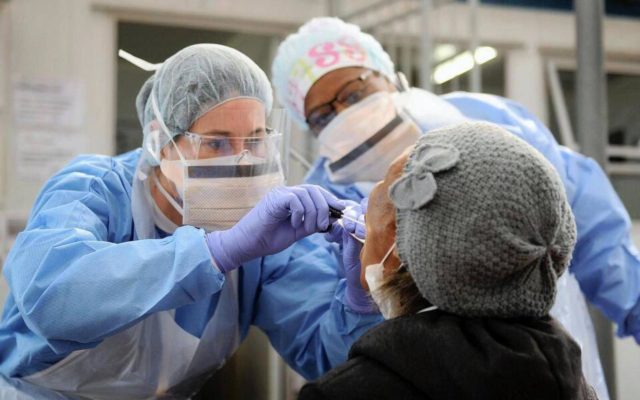All three had underlying illnesses.
Cape Town – The Western Cape has recorded another three Covid-19 deaths – two men, aged 78 and 67, and a 79-year old woman – all with underlying illnesses.
This brings the total number of deaths in the province to 38. As of 5pm on April 28, the Western Cape recorded 1 935 confirmed cases of Covid-19 infection, Western Cape Premier Alan Winde said on Wednesday. The number of tests conducted now exceed 30 000.
Yesterday, the Western Cape, at 1 870 confirmed cases and 35 deaths, was the province with the highest number of Covid-19 positive cases, followed by Gauteng (1 377), KwaZulu-Natal (919) and Eastern Cape (616).
After the Witzenberg municipality, a rural area with a large community of seasonal farmworkers, recorded 100 new cases on Monday, only two more cases have been reported.
Western Cape
Total confirmed COVID-19 cases
1935
Total recoveries
624
Total deaths
38
Total active cases (currently infected patients)
1273
Total number of tests
30803
Patients in hospital
84 with 26 in ICU
Sub Districts Cape Town Metro
Sub-district
Cases
Western
408
Southern
212
Northern
96
Tygerberg
224
Eastern
195
Klipfontein
145
Mitchells Plain
148
Khayelitsha
232
Total
1660
Sub Districts Non-Metro
District
Sub-district
Cases
Garden Route
Bitou
5
Garden Route
Knysna
15
Garden Route
George
14
Garden Route
Hessequa
5
Garden Route
Mossel Bay
19
Garden Route
Oudtshoorn
3
Cape Winelands
Stellenbosch
19
Cape Winelands
Drakenstein
14
Cape Winelands
Breede Valley
24
Cape Winelands
Langeberg
3
Cape Winelands
Witzenberg
102
Overberg
Overstrand
11
Overberg
Theewaterskloof
1
West Coast
Bergrivier
2
West Coast
Saldanha Bay Municipality
3
West Coast
Swartland
6
Unallocated: 29
Increased screening and contact-tracing efforts in the Witzenberg municipality – comprising the five towns of Ceres, Tulbagh, Wolseley, Op-die-Berg and Prince Alfred Hamlet – saw the area become a hot spot.
“Cabinet today received a full presentation the co-ordinated response to Covid-19 infections in the Witzenberg region,” Winde said.
“The response included an overview of screening and testing conducted to date, updates on engagements with businesses and farmers in the area as well as planned responses in the transport space.
“The Departments of Agriculture and Health are currently engaging with the industry in order to develop guidelines for screening and testing on farms and have already advised on protocol for the transportation of agri-workers.
“Over 35 000 masks have also been distributed to farmworkers in the region, with the assistance of AgriWC and AFASA.
“In total, we have screened nearly 200 000 people and tested over 7 000 of these.
“Our screening and testing follow an active case finding approach, where we rigorously follow the pockets of infections within communities.
Community screening helps us to identify where infections may be prevalent, and to test, isolate and quarantine as necessary.”
Meanwhile, Local Government, Environmental Affairs and Development Planning MEC Anton Bredell said while the Western Cape has surpassed other provinces in terms of positive cases of Covid-19, this is a natural result of the extremely rigorous testing approach that the province is undertaking.
“A major focus outside of the health sector, remains ongoing humanitarian and feeding initiatives to assist vulnerable communities during the Covid-19 pandemic.
“The provincial Department of Local Government has allocated additional funding of R16.2 million to various municipalities in the Western Cape with a focus on those municipalities most at need.
“Our municipalities are already providing much-needed relief in various forms, including soup kitchens, homeless shelters and food parcels. This allocation will assist them in continuing to do so. The funds have been transferred directly to the municipal accounts.”
Some of the work being done in municipalities across the province:
* Knysna Municipality provided over 1 500 food parcels to the most vulnerable members of the community over the weekend of 24-26 April.
* In Stellenbosch, community screening and testing is being done in Kayamandi, Cloetesville and Klapmuts and progressing well. Increased roadblocks and patrols by SAPS are helping to ensure lockdown regulations are adhered to. Key public spaces continue to be cleaned and sanitised.
* Bitou municipality is doing screenings in Kranshoek and Wittedrift. Food-relief efforts continue as well as loudhailing in vulnerable communities to keep communities informed.
* Mossel Bay Municipality continues with sanitising of public spaces as well as installing water tanks for additional resources in vulnerable communities.
* Hessequa municipality continues to sanitise and disinfect public facilities (including courts), as well as public toilets in informal settlements on a daily basis.
* Community screening and testing continues in various towns across the West Coast region as the West Coast District Municipality, in partnership with local municipalities, continue to work towards a safer and more hygienic environment.
* WCDM Fire Services is assisting the South African Police Service by sanitising the reception areas and holding cells of police stations across the West Coast District.
* The City of Cape Town has decided to reopen 19 strategically positioned ablution facilities across the metropole. This will be done in close cooperation and consultation with the City’s Health and Social Development Departments.
* The City’s Health Department and its Metro Health Services partners have conducted 70 310 screenings and 5 767 tests in the metropole.
The City is currently reprioritising Ward Allocations Budgets to unlock funds to assist struggling residents with food and sustenance provision. The City’s food relief programme will be rolled through all 24 sub-councils and recognised NGOs as soon as the budget reprioritisation is completed.
Bredell has urged all citizens with questions or concerns to visit the provincial website: www.westerncape.gov.za/coronavirus or to get in touch with their local municipalities for assistance.
IOL








